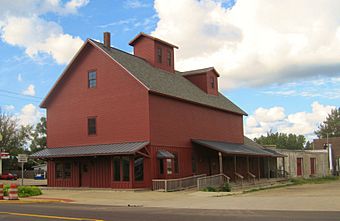Bangor Elevator facts for kids
Quick facts for kids |
|
|
Bangor Elevator
|
|
 |
|
| Location | 142 W. Monroe St., Bangor, Michigan |
|---|---|
| Area | less than one acre |
| Built | 1873 |
| Architectural style | Timber-frame grain elevator |
| NRHP reference No. | 09000523 |
| Added to NRHP | July 14, 2009 |
The Bangor Elevator is a historic building in Bangor, Michigan. It's a special kind of building called a grain elevator, which was used to store and move crops like corn or wheat. It's located at 142 West Monroe Street. This important building was added to the National Register of Historic Places in 2009 because of its history.
Contents
A Look Back: History of the Bangor Elevator
The area around Bangor was first settled in the 1830s. But it didn't grow much until 1856. That's when Joseph H. Nyman built a sawmill.
In 1860, Nyman planned out the village of Bangor. Then, in 1870, a railroad line was built through the village. This was a big deal! The railroad made Bangor a key spot. Farmers could easily ship their timber and crops from here.
Who Owned the Elevator?
In 1873, Horace Sebring and Mitchell Hogmire built this grain elevator. They put it right next to the railroad tracks. A few years later, they sold it to Edwin R. Olds and the Olney brothers.
In 1883, William A. Charles and Fred N. Overton bought the elevator. Overton then bought out Charles in 1889. Around 1900, Frank Overton took over the business. He added coal storage to the elevator.
Sam Martindale bought it in 1907. Two years later, he sold it to Tom and Lou Church. The Church Brothers started selling more than just grain. They also sold farm equipment and even Ford cars!
Moving and Changing Purpose
In 1926, the building was moved. It was placed 15 feet farther from the railroad tracks. This gave it a new foundation.
In 1939, a group of local farmers bought the elevator. They were called the Bangor Fruit Growers Exchange. This group and later owners used the building as a grain elevator. It was also a farm supply store until about 1990. After that, it was only a farm supply store. It finally closed for good in 2001 or 2002. The city then bought the building.
In 2003, the city sold it to Bangor Restoration, LLC. This company promised to fix up the old building. By 2006, the elevator looked much better. Today, you can rent it for events like parties or receptions.
What Does the Elevator Look Like?
The Bangor Elevator is a two-story building. It's made of wood and has a pointed roof, called a gable roof. The building sits on a foundation made of fieldstone.
Outside the Elevator
The main part of the building is about 36 feet by 60 feet. There's also a smaller section in the back. This part was added in 1944. The whole building is painted a dark red color.
The lower part of the building has special siding. It's called vertical board-and-batten siding. The upper part of the elevator has clapboarding. This is made of overlapping wooden boards.
The roof is steeply pitched and covered with asphalt shingles. You'll see a small structure on top of the roof. It's called a cupola. There are also dormers on each side of the roof. These are small windowed sections that stick out.
At the front, there's a small roof over the main entrance. This is called a shed roof canopy. Windows are on either side of the entrance. More windows are on the second floor and in the pointed part of the roof. Each side of the building has a sliding door and a double-hung window. There's also a window at the very back.
Inside the Elevator
Inside, the walls are covered with vertical wooden boards. The floors are made of new wood. You'll find an electric-powered elevator on one wall. Two staircases lead to the second floor. These stairs were built using wood from the old grain bins.
The second floor used to be full of large, rectangular wooden bins. These bins were used to hold grain. Some of them have been removed over time.



